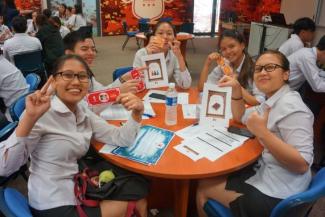
“For small states like Singapore, the United Nations remains one of the most important defenders of international peace, security, and the rule of law. The UN is a vital forum for small voices to be heard, and for regional groupings such as ASEAN, to occupy a larger stage”, said SMU Chairman Ho Kwon Ping in his Welcome Remarks at the lecture by His Excellency Mr Ban Ki-moon, Secretary-General of the United Nations as the 8th distinguished speaker for SMU's Ho Rih Hwa Leadership in Asia Public Lecture Series on 29 August 2016.
Mr Ho added that since Mr Ban’s first election as Secretary-General 10 years ago, he has continually mobilised global leaders and the United Nations community to promote sustainable development, empower women, support chronically instable and impoverished countries, and generate a new momentum on arms control and disarmament, and nuclear non-proliferation.
Mr Ban was on a two-day working visit to Singapore, the first leg of his five-stop Asia tour. He last visited Singapore in 2012.
More than 3,500 guests turned up for the lecture held at Suntec Convention Centre, including Members of Parliament, ambassadors, SMU trustees and community, as well as a large contingent of students from various junior colleges, polytechnics and international schools.
In his speech, Mr Ban lauded Singapore for being a leader in sustainable urbanisation and on the cutting edge of innovation, energy efficiency and waste management. He said that at a time of global divisions, Singapore continues to build a prosperous society of tolerance and co-existence, and that the country is a force for regional stability and solidarity through its involvement in ASEAN.
Mr Ban expressed his appreciation for Singapore’s wide-ranging cooperation with the UN, which includes partnering with the UN Development Programme to establish the Global Centre for Public Service Excellence, and hosting the “Responsible Business Forum” scheduled to take place in Singapore in November.


Turning his attention to global challenges, Mr Ban first called on all countries to align their policies, programmes and spending behind the 2030 Agenda for Sustainable Development, which comprises 17 Sustainable Development Goals for ending poverty and ensuring lives of dignity for all on a healthy planet.
On climate change, Mr Ban said that tackling this challenge is essential for sustainable development. He said, “The actions needed to reduce emissions and build climate resilience are among those that are needed to implement the 2030 Agenda and set the world on course for prosperity and security.” He expressed his hope that the Paris Agreement will take effect before the end of the year, and urged Singapore to ratify the Agreement.
Mr Ban next touched on unresolved conflicts and unending suffering. “Conflicts and protracted crises pose grave risks to our ability to deliver on the promise of the 2030 Agenda…. At least 130 million people need humanitarian assistance – the largest such caseload the United Nations has ever had to address. More than 65 million people have been forcibly displaced from their homes, more than at any time since the Second World War.” He encouraged countries such as Singapore, with their expertise and prosperity, to engage actively in UN peace operations and help to address the roots of conflict, prevent violent extremism and address other threats.
On regional issues, Mr Ban urged the new Myanmar leadership to overcome discrimination, ensure equality and promote inclusive development for all, with full respect for human rights. On South China Sea tensions, he reiterated his call to all involved to resolve these disputes through peaceful dialogue, in accordance with the universally recognised principles of international law. On ASEAN, Mr Ban voiced the importance of aligning ASEAN’s Vision 2025 behind the 2030 Agenda for Sustainable Development, and welcomed the establishment of the ASEAN Intergovernmental Commission on human rights, and the development of an ASEAN human rights declaration. For the Korean Peninsula, he said that it is necessary to “find the path back to denuclearisation through sincere dialogue. I stand ready to contribute in any way that might be helpful.”

Following the lecture was a Q&A session moderated by SMU Chairman Ho Kwon Ping. Before the start of the session, Mr Ho presented Mr Ban with a SG50 flag, in response to Mr Ban’s wish as expressed in his speech that he hoped to bring a SG50 button or a banner home as a souvenir.




A long line of guests queued patiently to ask questions on a range of topics including sustainability, gender equality, human rights, global peace, and even how the UN can help resolve the haze problem plaguing Southeast Asia.
Responding to a question, Mr Ban said that the issue of climate change is something close to his heart. “I have devoted almost all my time and energy in making sure that climate change is properly addressed. I have travelled all around the world, and I could find and see for myself the impact of climate change. Without seeing for myself, I would not have the power to convince.”
The Ho Rih Hwa Leadership in Asia Public Lecture Series seeks to inspire students and the public with the views and valuable opinions of accomplished entrepreneurs, business and political leaders, from within Asia and beyond. The series has been graced by eminent thought leaders including two Singapore Prime Ministers, Mr Lee Kuan Yew and Mr Lee Hsien Loong; two Nobel Peace Prize Laureates – Burma’s Aung San Suu Kyi and former South African President Mr Frederik de Klerk; and other eminent leaders such as former President Mr Benigno Aquino of the Philippines and former Prime Minister of Malaysia, Dr Mahathir Mohamad.